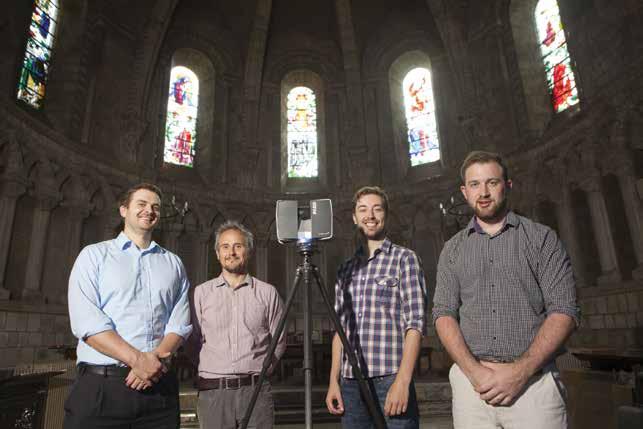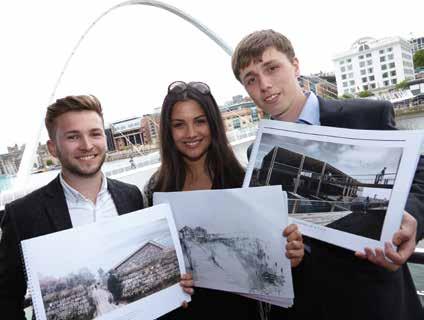
5 minute read
Insight into the influence of 18th Century Britain
Fifty Shades of Grey, Keira Knightly and Starbucks – what do they all have in common? Well let’s just say they wouldn’t be what they are today if it wasn’t for the movers and shakers of 18th Century Britain.
Asignificant body of research, conducted by Northumbria academics, looks at themes from the long 18th Century (1660 – 1832) and the way in which historical events and developments have impacted on our lives today.
In November, this research will be brought to life through film screenings, public lectures, debates and even an 18th Century coffee house recreation as part of the national Being Human festival.
Relax in style and comfort with these unique, design-led furniture and interior products, also created by a 3D design graduate. James has even been profiled by Design Week magazine.


Available from jamesuk.com
National stores such as Habitat have snapped up 3D Design graduate David’s contemporary designs and you can too. You can even see his work on campus as he won a competition to design the gates to City Campus East back in 2007.
Available from davidirwin.co (yes, that’s right!)
Kieron Day –
Wardrobe Wingman
Corporate Management graduate
Kieron’s colourful fashion accessories for men are designed to brighten up the dullest of outfits. His colourbud lapel badges have even been spotted on Justin Timberlake’s chest!

Priced from just £8.
Available from wardrobewingman.com
Fashion Marketing graduate
Rosie creates stunning handmade headpieces and jewellery for weddings and formal occasions. One of her recent pieces even featured on the cover of Hello! magazine.

Available from rosiewillettdesigns.co.uk
A fun and quirky loose tea leaf company with unusual chocolate, fruit and sweet-shop flavours such as rhubarb & custard and Turkish delight, priced at just £4.75 each. Established by Early Years Education and International Human Resources Management students Stella and Jodi, you can try them out at omytea.com
Being Human is the UK’s first festival of the humanities, made possible by a grant from the School of Advanced Study, University of London, and supported by both the Arts & Humanities Research Council and the British Academy. As part of this national event, Northumbria’s academics will share their thought-provoking research directly with the general public to explore what it really means to be human.
So how exactly did the 18th Century shape the lives that we lead today? From health and celebrity culture, to literature and leisure activities, Northumbria’s research explores a range of inspiring and curious themes and discusses their relevance to modern society.
Can an illness be en vogue?
A major Leverhulme-funded project, Fashionable Diseases has seen Northumbria and Newcastle academics work together to explore how certain illnesses, such as melancholy, consumption and even biliousness, rose to the height of fashion in the 18th-century.
Clark Lawlor, Professor of Eighteenth-Century and Romantic Literature at Northumbria is director of the Fashionable Diseases project. He explains: “Whether it was ladies having attacks of the ‘vapours’ or aristocrats suffering from gout, the Georgian era provides us with many examples of diseases that appear to have associations with social, intellectual or emotional superiority.
“For example, when we think of artists and poets in this period, we might consider their struggles with melancholia and how such illnesses were given a certain amount of glamour. Could any poet of the 18th Century afford to be without at least a tinge of melancholia?
“In the 21st Century we are still affected by older mythologies of disease and creativity, and our research seeks to discover how labels can alter our conception of diseases. We will be sharing some of these findings during the Being Human festival, with talks exploring the fashionable diseases of Georgian Britain, as well as how mental illness affected the Royal Family in the 18th Century.”
The founding father of erotica
It wasn’t just poetic melancholy that caused a stir in the 18th Century. Author John Cleland paved the way for the likes of Fifty Shades of Grey with the introduction of Britain’s first erotic novel – Fanny Hill. The controversial writer is now under the spotlight of Professor Richard Terry, Northumbria’s Head of Humanities. Professor Terry said: “It’s interesting that students often assume that, because Fanny Hill was written many years ago, it won’t be as explicit or controversial as the likes of modern novels, like Fifty Shades

“However, our views in terms of what is deemed acceptable have changed so dramatically over the years that while today’s readers may appreciate that erotic fiction deserves a place in society, they may struggle with some of the controversial themes that early writers such as Cleland explored.
“However, it’s fair to say that without Cleland’s controversial writing, Fifty Shades may never have existed, let alone be made widely available on the supermarket shelves!”
Professor Terry’s festival talk will take audiences into the life and times of John Cleland, explain how the most banned book in Britain came into existence and how it paved the way for today’s popular erotic novels.
Coffee shop culture
As part of the Being Human festival, Northumbria’s academics will be reconstructing an 18th Century coffee house. Coffee shops started as places where people, who might not usually socialise, came together and debated politics, culture and fashion. They were the place to be if you wanted to find the latest news, and in fact, for many newspapers, a direct source of contributions and stories. Dr David Stewart, Senior Lecturer in Romanticism at Northumbria, is involved in organising the reconstruction event. He said:
No place for a lady
“When Addison founded The Guardian, he set up a coffee house to encourage contributions, and people posted their entries through the mouth of a white marble lion’s head.” Over the years, these venues have become much more relaxed spaces. Today, however, it isn’t rare to spot the odd business meeting in Starbucks, and customers sharing newspapers.
Dr Stewart added: “As part of the festival, we will be recreating the buzz and energy you might have found in the 18th Century coffee shop. We’ll stick to a modern day cuppa though. By all accounts, 18th Century coffee leaves a lot to be desired!”
It’s probably no surprise that it was deemed unacceptable to read about Fanny Hill in the long 18th Century. After all, the general public were shocked at the idea of a woman treading the boards on a stage, never mind the sexual antics of a prostitute!
“Early actresses were often equated with prostitutes – they were seen to be whoring their bodies on the stage”, explains Northumbria’s Dr Claudine van Hensbergen, lecturer in EighteenthCentury English Literature. Dr van Hensbergen’s research explores the rise of the female actor following an Act of Parliament in 1660 that enabled actresses to take to the stage for the first time. She said: “While there were indeed some actresses who became more famous for being someone’s mistress than for their theatre performances, many became shrewd business-women who were involved in running leading theatre companies.
“The popularity of early actresses also inspired celebrity culture. The minute women started appearing on the public stage, their audiences were equally fascinated by their private lives, and the emerging print marketplace catered to this public hunger, printing biographies, scandalous accounts and even 18th Century pin-ups of them.”
Without these important developments and legal shifts taking place, we probably wouldn’t have heard of Keira Knightly, Kate Winslet or Renee Zellweger. Can you imagine if Bridget Jones had to be portrayed by a man?
Dr van Hensbergen’s public lecture will ask whether our modern fascination with the private lives of celebrities is really such a new development, and explores case studies of powerful female figures who proved, against the popular opinion of the time, that women could, in fact, succeed.







